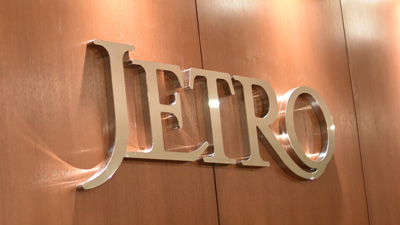Robotis Japan
Robotis, a Korean robot manufacturer that develops actuators* for robots used in research and educational fields, established its Japanese branch in Tokyo in November 2016. The company is highly lauded in the world as the de facto standard for robot actuators and has sales channels in many countries. It is currently developing business in Japan, a leader in the robotics field, in cooperation with companies, universities and research institutes.
-
*
Elements of a robot, such as motors and sensors, that transform energy input into physical motion to make it move.

Robotis Co., Ltd. (here in after “Robotis”) was founded in Korea in 1999 as a company engaged in R&D and sales of robot components used by companies and educational and research institutes. With little competition in the new field, demand for its products was high and sales steadily expanded. Repeated launches of robots and research projects using its products also led to interest in the company. Today, it conducts sales through agencies in 52 countries. It established a subsidiary in the US in 2009 and in China in 2016. In 2004, it began exports to Japan in cooperation with a partner company, and in November 2016, it established a Japanese branch.
Robotis received the Presidential Award of the “Robot Technology Award at the Robot Grand Challenge” organized by the Ministry of Knowledge Economy of Korea in 2012. It has also obtained ISO9001:2008 and ISO14001:2004 certification. In 2014, the New York Times selected its robot as one of 10 notable robots that year.
Robotis generates a revolution in robot manufacturing
Regarding the strengths of Robotis, Yoshihiro Shibata, Manager of the Japanese branch of Robotis stated “I’m proud to say that, to the best of my knowledge, Robotis is the only company supplying the global market with a continuous lineup of various sizes ranging from motors for small robots to those for life-size humanoid robots. In contrast to those for large industrial robots, there are few manufacturers of motors for small robots used in research and education. Among those companies, we provide a rich lineup for various uses, enabling us to develop business with many customers around the world.”

“DYNAMIXEL”, actuators of Robotis
He continued, “Robotis actuators, under the title “DYNAMIXEL,” range from those for robots used for the education of children (a few thousand yen in price) to those for life-size humanoid robots (over 300,000 yen). Starting with small and less expensive motors makes it much easier to move on to the next stage through learning and research.”
Mr. Shibata explained, “Until now, if you changed a robot’s housing or configuration of components, existing programs would no longer work, requiring major modifications, which led to huge losses of time and money. This resulted in a delay in the progress of robot research. Robotis’ DYNAMIXEL uses common communication specifications to control motors regardless of size, allowing the development of new robots without discarding the software resources one had been previously using. Further, by unifying separate functions which until now had to be consolidated in the configuration of a robot, we have succeeded in dramatically reducing the time needed for development. With these advantages recognized, we have particularly gained the support of robot researchers.”
The Robot Operating System (ROS), which is used globally as open-source middleware for robots, is also a great contribution to Robotis. “By using ROS, you can build one system connecting devices such as robots, motors, sensors and computers from different makers. As this will exponentially accelerate the development of robots and self-driving systems, ROS has gained attention to the extent that Toyota’s artificial intelligence research institute has invested hundreds of millions of yen. Robotis, in cooperation with the US-based organization that administers the system, developed an official ROS robot platform called “TURTLEBOT3” for learning use. As this platform has adopted Robotis’ DYNAMIXEL, ROS users in the world have come to know Robotis’ products. We could not have asked for better PR.”
Robotis starts business in Japan, a leader in the robot field
Regarding the reasons why Robotis entered the Japanese market, Mr. Shibata recalled, “Firstly, sales in the Japanese market via agencies were growing, requiring us to strengthen support. Secondly, Japan, which is known as a leading country in robotics, has many researchers in universities, companies and research institutes active in the field. The potential for growth was there in the market. We were also encouraged by projections that demand for robot components would grow further and, as of 2016, that the international robotics competition ‘RoboCup’ would be held in Nagoya in 2017, and that the ‘World Robots Summit’ organized by the Ministry of Economy, Trade and Industry would be held in 2018 and 2020.”
Upon entering the market, he says, “We felt our name recognition was insufficient to develop new customers. We compensated by conducting sales activities at academic conferences and robot-related events. Meanwhile, coming to Japan closed the distance with our agencies and customers, allowing quicker follow-up support. This had a great effect. The word-of-mouth praise by prominent Japanese robotics researchers was particularly helpful. Recently, we have received many proposals from Japanese companies for collaboration. Our work on “V-Sido;” robot control software developed by Asratec Corp., a SoftBank Group company; made headlines in the media. At first, the Japanese office consisted of just me and the accounting staff. Now, we operate with seven members including students working part-time from the universities such as University of Tokyo.”
The fact that its products are open-source also contributed to the company’s profile in Japan. “Many researchers and engineers who belong to Japanese universities, companies and research institutes are working on open-source systems. I feel that our name recognition has improved because we made the software and machine-design data related to Robotis’ products open-source via the web, enabling secondary use by other users free of charge,” said Mr. Shibata.
Robotis attracts attention at global robot festivals
Robotis has a strong presence at robot festivals in the world. At the “DARPA Robotics Challenge”, a disaster-response robot competition in the US, 25 teams from Japan, Germany, the US, Italy and Korea attended the final match, about a quarter of which used “THORMANG”, a Robotis life-size humanoid robot, or DYNAMIXEL. This had an excellent promotional effect, and led to the company forming relationships with researchers on rescue operations throughout the world. In Japan too, use of Robotis’ products is increasing. Under the support of the New Energy and Industrial Technology Development Organization (NEDO), research on rescue robots is proceeding in many places. Robotis motors are used in the rescue robot “FUHGA,” developed by Kyoto University, and a snake–like robot for checking industrial plants that is under research by the University of Electro-Communications, Kanazawa University, the Japan Science and Technology Agency and the Cabinet Office.

Yoshihiro Shibata, Japan branch Manager of Robotis Co., Ltd.
Launching “made-in-Japan” to the world
Regarding future development, Mr. Shibata enthusiastically said, “Today, Robotis’ products are used mainly in educational and research fields in Japan, but we want them to be included in robots for consumers in the near future. We also have a vision of working with Japanese companies to introduce robots using Robotis’ motors to the world as “made-in-Japan” products. Robotis is a Korean company, but we would like to build partnerships with Japanese companies in pursuit of that vison. In addition to continuous quality improvement, this will require collecting information on the types of robots that are needed in the world.”
JETRO’s support
For the establishment of Robotis’ Japanese subsidiary, the JETRO Invest Japan Business Support Center (IBSC) lent a temporary office, offered consultation on setting up a business base (registration, visa, tax and labor matters), referred to service providers (a certified legal specialist in visa applications, tax accountant, social insurance labor consultant, real estate agency and bank) and provided market information. Regarding JETRO’s support, Mr. Shibata said, “As an engineer working at the headquarters in Korea, I had no idea what was involved in establishing a Japanese branch, and JETRO’s support was very helpful. I particularly appreciate the introductions to service providers proficient in Korean, which made communication with headquarters all the smoother.”
(Interviewed July 2018)
Company history
- 1999
-
Establishment of Robotis Co., Ltd. in South Korea
- 2004
-
Start of business in Japan (export sales)
- 2009
-
Establishment of US subsidiary
- 2012
-
Earned President Award of the Robot Technology Award at the Robot Grand Challenge (organized by the Korean Ministry of Knowledge Economy)
- 2013
-
Selected as an IP* Star Company (organized by the Korean Intellectual Property Office)
-
*
Intellectual property
-
- 2013
-
Obtained ISO9001:2008 and ISO14001:2004
- 2014
-
Awarded the Technology Award from Korea Robotics Society
- 2014
-
Selected as one of the top 10 robots of the year by The New York Times Magazine
- 2015
-
Awarded the Industrial Service Medal(organized by the Korean Ministry of the Interior and Safety)
- 2016
-
Establishment of Chinese subsidiary
- Dec 2016
-
Establishment of Japanese branch in Tokyo
- Nov 2017
-
Awarded the ATC Technology Innovation Award (organized by the Korean Ministry of Trade, Industry and Energy)
- Oct 2018
-
Listed on KOSDAQ
Robotis Co., Ltd. Japan branch
- Establishment
-
December 2016
- Business overview
-
R&D, manufacturing and sales of robots in the research and educational fields, and of IoT products
- Parent Company
-
Robotis Co., Ltd. (Korea)
- Address
-
Haruhana Bild 3F, Kanda Ogawamachi, Chiyoda-ku, Tokyo, 101-0052
- URL
Support from JETRO
- Temporary office space (IBSC)
- Consultation (on company registration, visa, tax and labor matters)
- Referrals to service providers (a certified legal specialist in visa applications, tax accountant, social insurance labor consultant, real estate agency and bank)
- Provision of market information
Related Industry
Regional Information
Explore More
-

Success Stories
Success Stories are based on interviews conducted with foreign companies and foreign-affiliated companies that have successfully come into the Japanese market.
-

JETRO’s Support
We provide consistent one-stop service for establishing a base or expanding business in Japan.
-

Setting up Business
You can find information on overall and detailed steps, cost estimation, an overview of the laws, regulations and procedures related to setting up business, and more.
Contact Us
Investing in and collaborating with Japan
We will do our very best to support your business expansion into and within Japan as well as business collaboration with Japanese companies. Please feel free to contact us via the form below for any inquiries.
Inquiry FormJETRO Worldwide
Our network covers over 50 countries worldwide. You can contact us at one of our local offices near you for consultation.
Worldwide Offices




























